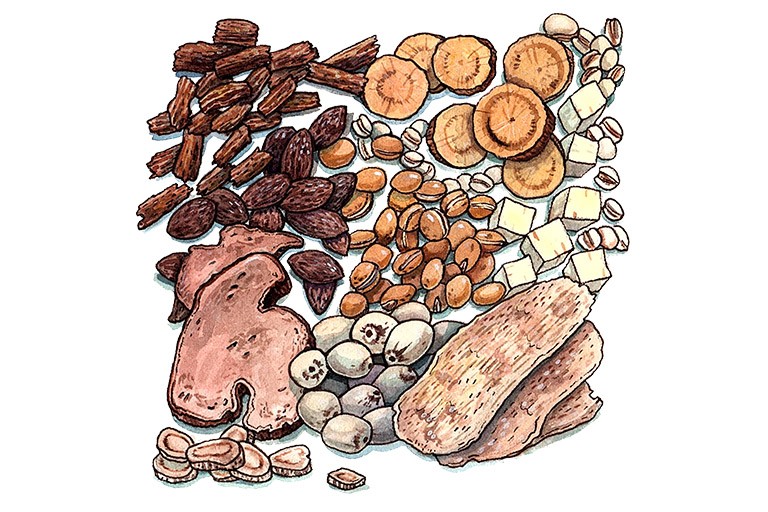
Common Names
- Ginseng & Atractylodes Formula
- Samryungbaekchul-san
- Jinryobyakujutsu-san
For Patients & Caregivers
Tell your healthcare providers about any dietary supplements you’re taking, such as herbs, vitamins, minerals, and natural or home remedies. This will help them manage your care and keep you safe.
Shen Ling Bai Zhu San (SLBZS) is a traditional Chinese medicine (TCM) formula. It’s made up of 10 different herbs.
Shen Ling Bai Zhu San is used to:
- Treat chronic diarrhea (loose or watery bowel movements for more than 4 weeks)
Talk with your healthcare providers before taking herbal formulas. They can interact with some medications and affect how they work. For more information, read the “What else do I need to know?” section below.
Side effects of SLBZS may include:
- Abdominal swelling
- Constipation (difficult or infrequent bowel movements)
- Nausea (feeling like you’re going to throw up)
- Vomiting (throwing up)
- Rash
- Allergy
- Stop taking SLBZS at least 1 week before surgery. It can increase your risk of bleeding.
- Talk to your healthcare provider if you have hormone-sensitive breast cancer. Some herbs in SLBZS may not be suitable for you.
For Healthcare Professionals
Shen Ling Bai Zhu San (SLBZS) is a traditional Chinese medicine (TCM) formula with a long medicinal history as a treatment for chronic diarrhea. First described in the ancient medical text Tai Ping Hui Min He Ji Ju Fang, it consists of 10 herbs: Ren Shen (Panax ginseng C.A. Mey or Asian Ginseng), Fu Ling (Poria cocos (Schw.) wolf), Bai Zhu (Adactylies macrocephala Koidz Rhizome), Gan Cao (Glycyrrhiza uralensis fisch or Licorice), Bai Bian Dou (Dolichos lablab), Shan Yao (Dioscore opposita thumb), Lian Zi (Nelumbo nucifera), Jie Geng (Platycodon grandifloras (Jacq.) A. DC.), Sha Ren (Amomum villosum Lour.), and Yi Yi Ren (Coix lacryma-jobi L. var. ma-yuen (Roman.) Stapf). Today, SLBZS continues to be used by practitioners in the Asia-Pacific region to manage chronic diarrhea (1) (2) and is the second most prescribed formula for post-surgery colon cancer patients in Taiwan (3).
Clinical data are largely limited to Asian population. A pilot, four-arm, randomized controlled trial of patients with diarrhea-predominant irritable bowel syndrome (D-IBS) found SLBZS to be associated with improvements in D-IBS symptoms. In addition, abdominal pain and frequency, discomfort, and stool form showed greater improvements in patients who took SLBZS with or without otilonium bromide, an antispasmodic drug, compared to the otilonium bromide and placebo groups. Notably, patients in the SLBZS and SLBZS + otilonium bromide arms had fewer adverse events compared to those in the otilonium bromide and placebo groups (1).
In patients with ulcerative colitis, both SLBZS and modified SLBZS were found to be more effective than the first-line therapy mesalamine for controlling diarrhea, abdominal pain and fever (4) (5). A large review found SLBZS to be the second most prescribed formula for ulcerative colitis, citing the need for well-designed studies (6).
This formula was also superior to the quinolone antibiotic norfloxacin for symptom management in patients with chronic diarrhea of unknown etiology (7).
A systematic review and meta-analysis (14 trials, 1158 patients with ulcerative colitis, chronic diarrhea and D-IBS) reported significant improvements in patient-reported satisfaction with SLBZS or SLBZS combined with conventional medicine compared with conventional medicine alone; and pooled analysis of 9 trials showed that SLBZS did not increase the risk of adverse effects compared with controls (8). Additional methodologically robust trials are needed to bolster the evidence base surrounding SLBZS. Because diarrhea is associated with many gastrointestinal disorders, future studies should also use a global diagnostic code of gastrointestinal disease to yield unambiguous data.
- Chronic diarrhea
Pharmacological studies suggest that SLBZS promotes the integrity of intestinal barrier, regulates inflammatory factors, and modulates gut microbiota by reducing the levels of potential pathogens and increasing those of beneficial bacteria (9) (10) (11) (12). Additional research is needed to further identify the mechanisms via which SLBZS exerts anti-diarrheal effects.
- Shen Ling Bai Zhu San contains Ren Shen (Asian Ginseng) and should therefore be discontinued at least 1 week prior to surgery (13).
- Shen Ling Bai Zhu San contains Gan Cao (Licorice) and Shan Yao (Chinese Yam related to Wild Yam), which have estrogenic properties. But data are lacking to determine if SLBZS acts as a phytoestrogen. It is advisable for patients with hormone-sensitive breast cancer to discuss with their physicians the risks and benefits of starting or continuing SLBZS.